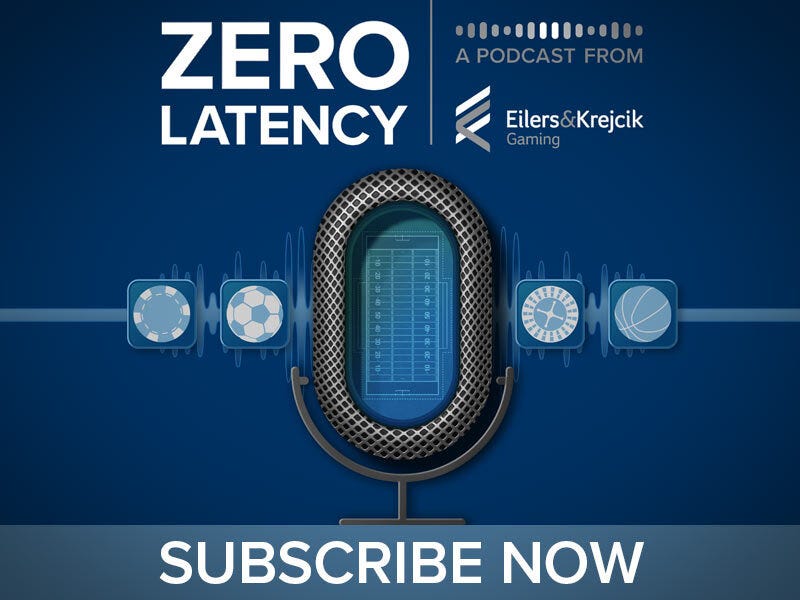The Camel's Nose
Gambling is typically a state-level issue, but there are currently numerous gambling efforts occurring at the federal level.
The Bulletin Board
NEWS: Reps. Dina Titus and Guy Reschenthaler urge the IRS to raise the slot threshold from $1,200 to $5,000.
NEWS: Rep. Paul Tonko wants HHS to classify problem gambling as a mental health disorder.
LOOSE ENDS: WV bill requires anonymized data; NCLGS partners with UKGC; CT Gambling Impact Study;
QUICK HITTER: PrizePicks reaches a $15 million settlement with NY.
NEWS: iDEA Growth report attempts to assuage cannibalization concerns.
VIEWS: Politico pulls back the curtain on political donations by gambling firms.
AROUND the WATERCOOLER: Phil Hellmuth talks poker and life.
STRAY THOUGHTS: Don’t rule out federal action.
Sponsor’s Message - Kambi Group is the leading provider of premium sports betting technology and services, empowering operators with all the tools required to deliver world-class sports betting and entertainment experiences.
The Group’s services not only include its award-winning turnkey sportsbook but also an increasingly open platform and a range of standalone sports betting services from frontend specialists Shape Games, esports data and odds provider Abios, and AI-powered trading division Tzeract. Together, we are limitless.
Visit: www.kambi.com
Gaming Caucus Supports Raising the Slot Threshold
Rep. Guy Reschenthaler and Rep. Dina Titus, the co-chairs of the bipartisan Congressional Gaming Caucus, sent a letter of support for the IRS Advisory Council’s (IRSAC) recent recommendation to raise the slot reporting threshold to account for inflation.
The letter notes that the IRSAC report concludes that the IRS can raise the limit via a regulatory change.
The current reporting threshold is set at $1,200. The industry has called the threshold antiquated ($1,200 since 1977) and is lobbying to increase it to $5,000. Raising the slot reporting threshold has been a top policy item for the American Gaming Association.
“We urge you to follow the IRSAC’s recommendation and exercise your authority to raise the threshold for slot machine jackpot winnings to $5,000 and to consider periodic increases to the threshold based on inflation,” Reschenthaler Titus said in the letter. “Taking this action will align with the IRS initiative to strategically use data to improve tax administration and modernize tax reporting for our constituents.”
Rep. Tonko Wants HHS to Weigh In On Problem Gambling
In other federal news, Rep. Paul Tonko has sent a letter to Health and Human Services Secretary Xavier Becerra asking if gambling addiction is covered for treatment and benefits under the Affordable Care Act.
The letter reads in part:
“As a known and recognized addiction, gambling disorder should be treated with the same importance and urgency as drug and alcohol disorders.
“When the Affordable Care Act was finalized in February 2013, full coverage for substance disorders and mental health treatment was guaranteed as one of the ten essential health benefits.
“However, since gambling disorder is not explicitly listed, we have been hearing problematic reports from patients, medical professionals, and experts in the field that insurance companies are denying coverage for treatment of gambling disorder and gambling-related harm and instead are referring patients to the various helplines for treatment.
“I am requesting that the Department of Health and Human Services formally and publicly clarify that HHS recognizes gambling disorder is a mental health and substance use disorder, and as such, is required to be covered as an essential health benefit.”
Last year, Tonko took aim at gambling advertisements, sponsoring the Betting on Our Future Act, which would prohibit “advertising of sportsbooks on any medium of electronic communication subject to the jurisdiction of the Federal Communications Commission.”
Loose Ends: WV Anonymized Data Bill; NCLGS Partners With UKGC; CT Gambling Impact Study
A new bill in West Virginia would require all online gambling operators to submit anonymized player data for research - New Jersey has a similar requirement and produces an annual report. The West Virginia Responsible Gaming and Research Act (HB 5668) is sponsored by Speaker of the House Roger Hanshaw and Del. Shawn Fluharty, the President of the National Council of Regulators from Gaming States (NCLGS).
Speaking of NCLGS, the group announced it was working on crafting model online gambling legislation at its winter meeting in January. Last week, the group announced a partnership with the UK Gambling Commission, which will serve as a special advisor and help with the effort.
Connecticut’s first annual gambling impact study has been released; several findings stand out. None more attention-getting than “71% of all legal gambling revenue in the state comes from the fewer than 7% of residents who are a problem (1.8%) or at-risk gamblers (4.9%).” I’ll dig into this report a little deeper next week.
Quick Hitter: PrizePicks Reaches $15 Million Settlement with NY
Earlier this week, we learned PrizePicks is pulling its paid contests from New York. New reporting by ESPN indicates the company will also be paying a $15 million settlement for operating without a license.
The settlement led to speculation that this could be the tip of the iceberg, but according to Nicholas Green, who serves as Underdog’s (a newsletter sponsor) General Counsel:
“The issue is not the type of fantasy product, the issue is they were not permitted to offer ANY fantasy product, due to NY’s req that you hold a fantasy license to offer any paid fantasy contest (salary cap DFS, Best Ball, anything). It has nothing to do with Pick’em.”
That makes sense, as Sleeper Fantasy had already exited the New York market, and there doesn’t appear to have been a settlement.
New Report Pushes Back on Cannibalization Concerns
iDEA Growth commissioned a report from gambling research firm Eilers & Krejcik Gaming (a newsletter sponsor) to debunk the online gambling cannibalization concerns that have arisen in several states.
“This study offers compelling evidence that online gambling is a catalyst for growth, not a competitor to land-based casinos,” iDEA Founder and General Counsel Jeff Ifrah said.
Some of the most compelling evidence was the statements from five current and former casino executives, including Penn’s Jay Snowden, who said:
“… roughly 66% of [our online casino] players [are] new to our ecosystem or reconnected former patrons. The average age of these players is much younger than our core land-based player, which highlights the lack of cannibalization iCasino has had on our brick and mortar business in the first quarter.”
Several operators shared data (see image below) on the swinging door between their land-based and online casinos. The “minimal crossover between the two sets of customers is one of the biggest reasons that cannibalization has not been observed,” the report states.
On the math front, EKG looked at land-based casino revenue in six states before and after the introduction of iGaming. “All six states showed a positive impact on land-based casino revenue from the introduction of online casinos, with an average quarterly revenue increase of +2.44%.”
More interestingly, “Casino markets with iGaming performed better than land-based-only casino states.”
In a key Takeaway, the EKG team wrote:
Land-based and online casino draw different kinds of customers because each product provides a fundamentally different experience. An online casino visit, for example, is typically measured in minutes, while a land-based casino visit is more likely to be measured in hours. The graphic below provides a surface analysis of major differences between the online and land-based casino experience.
The EKG-iDEA report also takes aim at the TIG report commissioned by the state of Maryland, pointing out several flaws:
“The report arbitrarily compares performance between 2019 and 2022 for all states regardless of when they introduced online casinos.” EKG notes that New Jersey and Delaware launched in 2013, so cannibalization should have appeared before 2019.
“Four states included in the study launched online casinos at the start of the 2019 comparison period, meaning some portion of the changes in performance happened before the existence of online casinos in those markets.” EKG estimates that 83.4% of Connecticut’s decline occurred by 2021 - the state launched online casinos in October 2021.
“The study erroneously double-counts population growth, which inflates its results, and it includes minors as part of the potential gambling population.” EKG notes, “Double counting population effects is an error that was done in both the iGaming and non-iGaming states, and it adds unnecessary noise to the estimates.”
I’ll take a deeper dive into the full 35-page report next week. The big question is, will the report counteract the previous studies in Maryland and Indiana? Will it further muddy the already very muddy waters? Or will everyone trumpet the report that suits their views in a you have your facts, and I have mine scenario?
SPONSOR’S MESSAGE - SUBSCRIBE NOW to Zero Latency, the new podcast from Eilers & Krejcik Gaming that provides unparalleled insight into the U.S. online gambling industry through interviews with industry insiders and analysis from EKG experts.
Politico Sheds Some Light on Political Contributions
Let me preface this entry by saying this is not a new development, nor is there anything nefarious about these donations. That said, the optics never look good, particularly when the beneficiary has to make a decision that impacts the contributor.
“California Attorney General Rob Bonta, a Democrat, is currently probing the lawfulness of daily fantasy sports betting in the state, and other prosecutors have issued warnings of deceptive practices by sports betting companies since the Supreme Court overturned a virtual ban on the industry over five years ago.
“Over the last year, the fantasy sports industry has given hundreds of thousands of dollars to associations of attorneys general on both sides of the aisle.”
In a statement to Politico, Bonta’s office said, “Decisions are based solely on the law and protecting the safety, health, and well-being of all Californians.”
It’s also important to point out that donations are coming in on both sides of these issues.
Around the Watercooler
Social media conversations, rumors, and gossip.
Poker.org has a new podcast, and they landed Phil Hellmuth for Episode 1 - If you’re up for it, drink every time there is a name drop.
Stray Thoughts
Most people dismiss the idea of federal action, but the stories above, the interest in election betting (here and here), and the GRIT Act indicate that it’s not out of the realm of possibility.
We’ve had a few brushes with scandals (Alabama baseball, Iowa and Iowa St., and plenty of other examples), and it will only take one to capture the attention of Congress.
If you’re still not convinced how quickly things can change, read up on the DOJ’s Wire Act opinions in 2002, 2011, and 2018.






